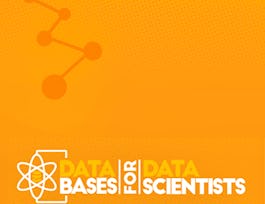Back-end developers write applications that end-users use to interact with databases. Some common tasks that end-users carry out using these applications include storing, searching, extracting and manipulating data.



Introduction to Databases for Back-End Development
This course is part of Meta Back-End Developer Professional Certificate

Instructor: Taught by Meta Staff
Sponsored by Coursera Learning Team
43,679 already enrolled
(609 reviews)
Recommended experience
See how employees at top companies are mastering in-demand skills

Build your Mobile and Web Development expertise
- Learn new concepts from industry experts
- Gain a foundational understanding of a subject or tool
- Develop job-relevant skills with hands-on projects
- Earn a shareable career certificate from Meta


Earn a career certificate
Add this credential to your LinkedIn profile, resume, or CV
Share it on social media and in your performance review

There are 5 modules in this course
In this module, you’ll receive an introduction to the course and explore possible career roles that you could follow as a database engineer. You’ll also review some tips on how to take this course successfully and discuss what it is that you hope to learn. As part of your introduction, you’ll learn about the basics of databases and data and how they work. You’ll then receive an introduction to SQL, or Standard Query Language, the coding syntax used to interact with databases. Finally, you’ll explore the basic structure of databases and discover the different types of keys they use.
What's included
12 videos10 readings4 assignments1 discussion prompt
In this module, you’ll explore CRUD, or Create, Read Update and Delete operations. You’ll begin with an exploration of SQL data types and learn how to differentiate between numeric data, string data and default values. You’ll also embark upon several exercises in which you’ll learn how to utilize these different data types within your database projects. You’ll then move on to learn how to Create and Read data within a database. You’ll discover how to create databases and tables and populate them with data using SQL statements. Lastly, you’ll explore the SQL statements used for updating and deleting data in a database. And to demonstrate your ability with CRUD operations, you’ll complete exercises that will task you with creating and managing data.
What's included
12 videos4 readings1 quiz9 assignments7 ungraded labs
In this module, you’ll explore SQL operators and learn how to sort and filter data. You’ll begin this module with a lesson on SQL operators. As part of this first lesson, you’ll explore the syntax and process steps used to deploy SQL arithmetic and comparison operators within a database. Next, you’ll discover how to sort and filter data using clauses. The clauses that you’ll learn about include the Order By clause, Where clause and Select Distinct clause. In each lesson item, you’ll receive an overview of how each clause is used to sort and filter data in a database. You’ll also view demonstrations of these clauses and then receive an opportunity to try them for yourself.
What's included
7 videos7 readings3 assignments1 ungraded lab
In this module, you’ll learn about database design. In the first lesson, you’ll receive an overview of how to design a database schema. As part of this overview, you’ll learn about basic database design concepts like schema and find out about different types of schemas. The next lesson focuses on relational database design. In this lesson, you’ll explore how to establish relationships between tables in a database using keys. You’ll also learn about the different types of keys that are used in relational database design, such as primary keys and foreign keys.
What's included
12 videos9 readings6 assignments1 ungraded lab
In this module, you’ll have an opportunity to recap what you learned and identify your strengths as well as target topics that you would like to revisit in this course.
What's included
2 videos2 readings1 assignment1 discussion prompt
Instructor

Offered by
Why people choose Coursera for their career




Learner reviews
609 reviews
- 5 stars
72.83%
- 4 stars
19.47%
- 3 stars
5.56%
- 2 stars
0.98%
- 1 star
1.14%
Showing 3 of 609
Reviewed on Oct 9, 2022
This is by far my favourite course with META. the videos, The instructor's teaching and delieving the content is pretty awesome.
Reviewed on Dec 15, 2022
It was a informative and precise course with sufficient labs to get hands on.
Reviewed on Dec 19, 2022
This is one of the best courses so far in this specialization. Very well presented, very easy to grasp, and very enjoyable. I highly recommend.
Recommended if you're interested in Computer Science

University of Colorado System

University of Colorado Boulder

Board Infinity

Open new doors with Coursera Plus
Unlimited access to 10,000+ world-class courses, hands-on projects, and job-ready certificate programs - all included in your subscription
Advance your career with an online degree
Earn a degree from world-class universities - 100% online
Join over 3,400 global companies that choose Coursera for Business
Upskill your employees to excel in the digital economy




